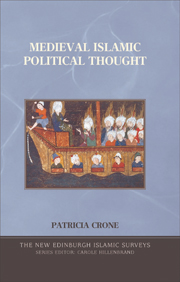Book contents
- Frontmatter
- Contents
- List of charts
- Preface
- Addenda and corrigenda
- I THE BEGINNINGS
- II THE WANING OF THE TRIBAL TRADITION, c. 700–900
- III COPING WITH A FRAGMENTED WORLD
- IV GOVERNMENT AND SOCIETY
- 17 THE NATURE OF GOVERNMENT
- 18 THE FUNCTIONS OF GOVERNMENT
- 19 VISIONS OF FREEDOM
- 20 THE SOCIAL ORDER
- 21 MUSLIMS AND NON-MUSLIMS
- 22 EPILOGUE: RELIGION, GOVERNMENT, AND SOCIETY REVISITED
- Charts
- Bibliography, abbreviations, and conventions
- Index and glossary
20 - THE SOCIAL ORDER
from IV - GOVERNMENT AND SOCIETY
Published online by Cambridge University Press: 05 August 2013
- Frontmatter
- Contents
- List of charts
- Preface
- Addenda and corrigenda
- I THE BEGINNINGS
- II THE WANING OF THE TRIBAL TRADITION, c. 700–900
- III COPING WITH A FRAGMENTED WORLD
- IV GOVERNMENT AND SOCIETY
- 17 THE NATURE OF GOVERNMENT
- 18 THE FUNCTIONS OF GOVERNMENT
- 19 VISIONS OF FREEDOM
- 20 THE SOCIAL ORDER
- 21 MUSLIMS AND NON-MUSLIMS
- 22 EPILOGUE: RELIGION, GOVERNMENT, AND SOCIETY REVISITED
- Charts
- Bibliography, abbreviations, and conventions
- Index and glossary
Summary
To the Arab conquerors, people were first and foremost members of descent groups such as tribes and nations rather than of social strata or classes. The key distinction was between Arabs and the rest, that is, the ajam or barbarians (especially Iranians). Arabs were free, autonomous tribesmen chosen by God to be the carriers of His last revelation and rulers of the world. Everyone else was misguided and (already or soon to be) defeated. There was no room in this simple view of things for non-Arab Muslims, yet converts soon appeared in significant numbers, introducing new ways and ideas which the Arabs not unnaturally felt to be wrong. “This community will take to innovation when three things come together: perfect prosperity, the attainment of adulthood by the children of captives, and both Arabs and non-Arabs reciting the Qur˒ān,” Uthmān is said to have predicted. The children of captives (abnā˒ al-sabāyā) whose dire influence is here being deplored were the offspring of Arabs by non- Arab concubines, a by-product of Arab domination; the non-Arabs reciting the Qur˒ān were mostly slaves and freedmen, also a product of Arab might, and both undermined the very order on which Arab power rested. Could mawālī (clients), as non-Arab Muslims were known, hold positions of authority over Arab Muslims? Most Arabs were outraged by the idea. Did they have the same chances of salvation as the people who had brought them the truth?
- Type
- Chapter
- Information
- Medieval Islamic Political Thought , pp. 332 - 357Publisher: Edinburgh University PressPrint publication year: 2004



